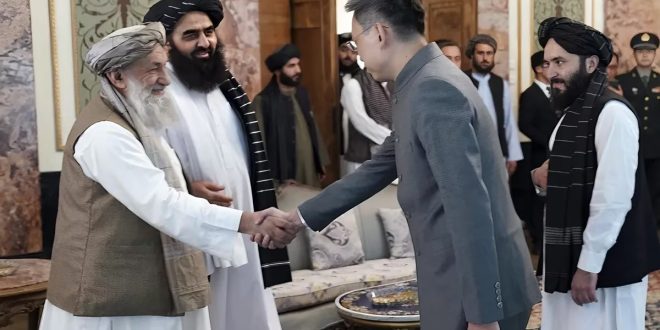AT News
KABUL – In a significant diplomatic move on September 13, Chinese envoy Zhao Sheng presented his credentials to Mohammad Hasan Akhund, Afghanistan’s Prime Minister, marking the first time the Taliban welcomed a new ambassador since their takeover of Afghanistan in 2021. While many countries have been cautious about establishing diplomatic relations with the Taliban-led government, China’s actions have attracted attention.
It’s important to note that Beijing still officially recognizes Ashraf Ghani’s government and has clarified that Zhao Sheng’s appointment doesn’t signify formal ties or recognition of the Taliban government. According to China’s Foreign Ministry, this appointment is part of the “normal rotation” of ambassadors. However, this differs from the approach of some other countries that have sent charges d’affaires instead of presenting credentials when ambassadors’ tenures ended in Kabul.
However, there might be a deeper strategic rationale behind China’s increased engagement with the Taliban. Beijing aims to fill the void left by the withdrawal of the U.S.-led Western bloc from Afghanistan. This expanded economic cooperation, combined with the recent ambassadorial appointment, reflects China’s desire to bolster its regional influence. China has already invested significantly in neighboring Pakistan, another ally of the Taliban, by incorporating the Taliban into the China-Pakistan Economic Corridor, part of its US$60 billion Belt and Road Initiative.
While the Taliban has faced international isolation due to its history of human rights violations, it seeks validation for its political power. Despite engagements with various countries and international agencies, none have granted the legitimacy it desires, with some imposing sanctions that hinder development aid. In its financial and political desperation, the Taliban appears willing to overlook allegations of Chinese human rights abuses against Uyghur Muslims.
China, in turn, seems willing to disregard these allegations and emphasizes non-interference in Afghanistan’s internal affairs while asserting respect for the nation’s independence and territorial integrity. Paradoxically, some groups posing threats to China’s interests in Afghanistan, such as the Islamic State and the Uyghur insurgents of the East Turkestan Islamic Movement, maintain strong ties with the Taliban, despite China’s efforts to sever these connections.
However, China’s engagement with Afghanistan isn’t purely altruistic. It seeks to exploit the region’s mineral wealth and establish dominance in the geopolitical order by creating dependencies on politically weak and volatile countries.
This unusual diplomatic courtship could have profound implications for Afghanistan and regional stability. China’s apparent neocolonial ambitions could solidify the Taliban’s grip on the country, providing fertile ground for various terrorist groups to operate. While the Afghan people may not immediately benefit from China’s investments, these diplomatic maneuvers shield the Taliban from international pressure and enhance China’s control over regional resources and political influence. The growing relationship between Beijing and the Taliban proves mutually beneficial for now, but it raises concerns about the future.
 Afghanistan Times
Afghanistan Times




